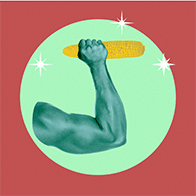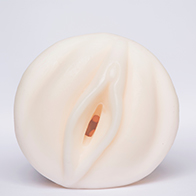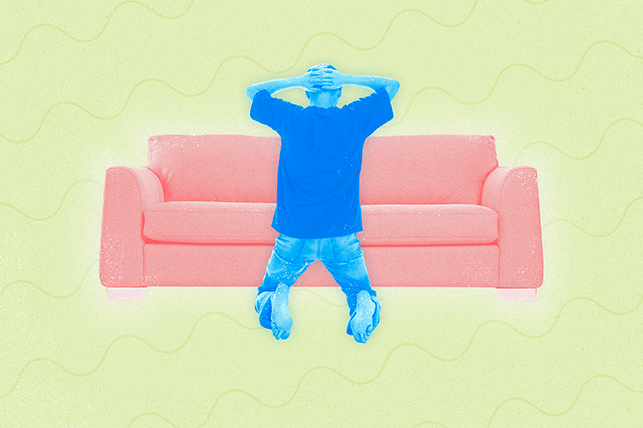Here's How to Treat Death-Grip Syndrome

Humans are a funny bunch. We all engage in certain activities: eating, sleeping, peeing, pooping, etc.
But we are endlessly creative and varied in our approaches. For instance, we all sleep, but some people may sleep during the day; some might take catnaps or siestas; some might sleep on their side, some on their back; some sleep naked, some decked out in full pajamas; some sleep with a pillow over their head, some might use a sleep mask. The list of specific ways you can approach this common activity is strikingly long.
The same goes for masturbation. Most people do it—84 percent of Americans, according to a Japanese study—and if you're talking specifically about adolescent boys and young men, that figure climbs closer to 100 percent, according to a University of Michigan study.
But the way you do it can make a big difference in how sex with a partner goes: Welcome to the world of "death-grip syndrome." Other terms used to describe less common types of solo play include traumatic masturbatory syndrome and idiosyncratic masturbation.
What is death-grip syndrome?
The first thing to note is that masturbation is a normal activity. Pay attention to a few broad parameters—don't involve unwilling participants, maybe wait until you get home from the mall, clean up after—and you can do it pretty much any way you see fit.
With masturbation being largely a solo activity, we all probably have our own unique approach, but people who masturbate in highly specific ways may experience certain consequences. This notion of unusual masturbation styles is often lumped together under the heading "death-grip syndrome."
It's called that because it frequently involves the man using an extremely tight grip on his penis or on one specific part of his penis—for instance, tightly pinching the penis head and frenulum with a thumb and two fingers. Doing so creates sensations that sex with a partner can't replicate.
Other specific masturbation techniques, such as using a pillow or an item of clothing or prone masturbation (lying on your stomach and using your body weight to create friction) may also be problematic. If the sensation that makes the man reach orgasm during masturbation is significantly different from the sensations of partnered sex, it can lead to frustration, delayed ejaculation and even erectile dysfunction (ED).
"One of the questions I always ask ED clients is, 'Is there anything unique or different about your masturbation style that you're aware of?'" said Natalie Finegood Goldberg, L.M.F.T., a sex therapist and psychotherapist with Creating Change LA in Los Angeles. "But then I also ask, 'Is there anything about your masturbation style that can't be replicated during intercourse?'
"So that covers the 'death-grip,' and sometimes I'll be more specific and ask whether they use a particularly tight grip, do they put pressure on a certain part of their penis. And there's also prone masturbation."
Those things can affect a person's ability to function with a partner since they can't be replicated.
How to treat death-grip syndrome
The death-grip problem is one of habituation—having created this habit of using certain intense or unusual sensations in order to reach orgasm over so many years that the "lesser" sensation of partnered sex doesn't do the trick. That means, in order to treat death-grip syndrome, you need to work on breaking these habits.
"Generally speaking, the approach to treatment includes kindly retraining their brain," Finegood Goldberg said. "There's a device called a Fleshlight, and oftentimes my recommendation is to stop masturbating with their hand and switch to utilizing a Fleshlight because it mimics the vaginal canal more. Plus, they have less control over what it feels like. So my front-line defense is sort of retraining your penis and retraining your brain."
Finegood Goldberg mentions Fleshlight specifically, but the variety of male masturbators is wide and includes sleeves, penis vibrators, blowjob simulators, rings and more.
Another piece of the puzzle is involving your partner in the discussion and, potentially, the treatment. Some people might be embarrassed to discuss their masturbation habits, but they may find their partner is relieved to hear the issue may be a mechanical one rather than something they believe they're doing wrong.
Enlisting your partner's help may even open up new doors in your sex life.
"Every person enjoys different types of stimulation. Even though we often think that the most pleasurable type of sexual activity for men is intercourse, this is not the case for all men," said Amy Pearlman, M.D., a men's health specialist and co-founder of Prime Institute in Fort Lauderdale, Florida. "If he needs more stimulation, I would encourage him and his partner to explore ways to provide that type of stimulation when together. This may include mutual masturbation, use of sex toys, his partner applying similar pressure to the penis, etcetera."
Sex is a fun solo activity, but it can also be a team effort involving both parties in a couple, especially when it comes to fixing problems in the bedroom.
"It's kind of about the collaborative support, an attitude of solving it together," Finegood Goldberg said. "Don't be like, 'Oh, that's weird,' when your partner pulls out a Fleshlight and says, 'My doctor says I need to try it.' Don't judge them."
Other potential death-grip syndrome problems
The death-grip issue usually lies with a man spending years becoming accustomed to a highly specific sensation, one that's markedly different from the sensation of penetrative or oral sex. There are a couple of medical issues that can contribute as well, including desensitization of the penis as a result of the following:
- Certain medications such as antidepressants
- High blood pressure
- Poorly controlled blood sugar and diabetes
- Nerve damage
- Low testosterone
If you suspect you are experiencing any of these, it's worth a doctor's checkup while you look into the issue of your masturbation style.
Takeaways of death-grip syndrome
Most people masturbate, and most people develop their own style. As long as your masturbation isn't interfering with your ability to enjoy partnered sex and causing distress to you or your partner, have at it, cowboy.
Maybe opening up the conversation to any difference in sensation between masturbation and partnered sex can open up some fun new avenues for you and your partner to explore together.




















